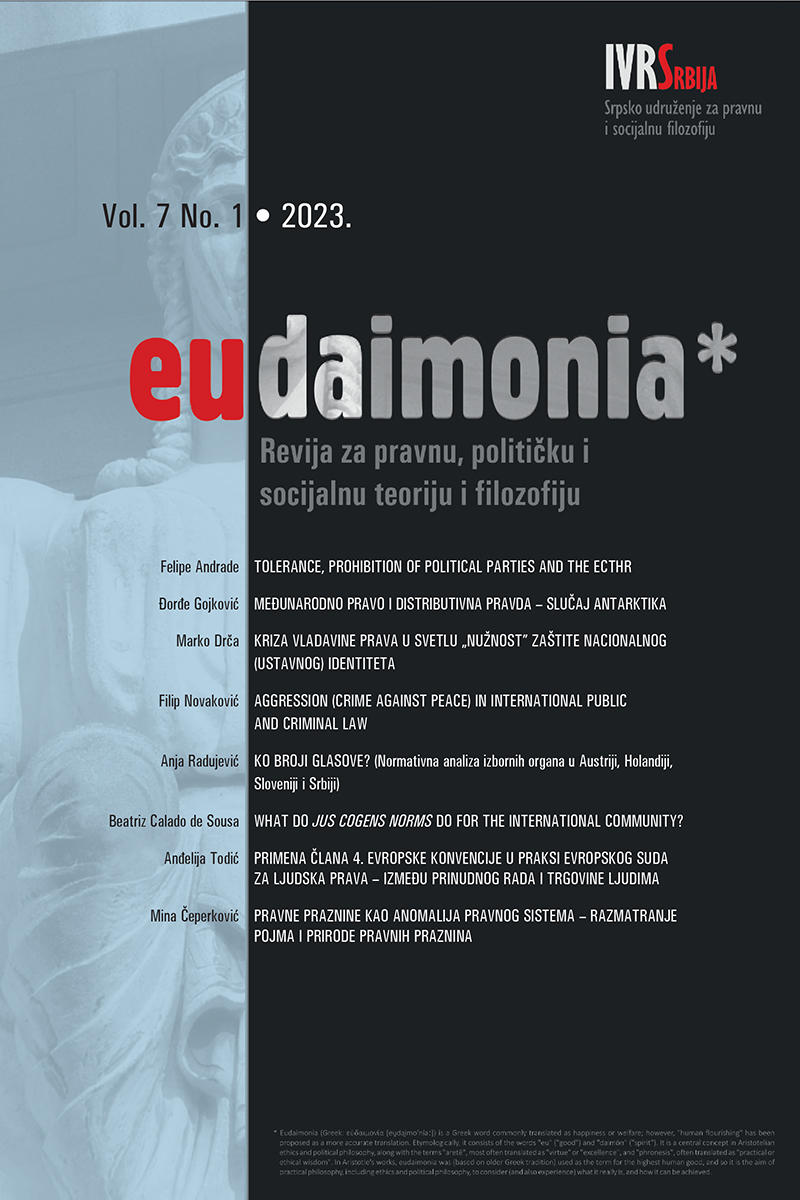TOLERANCE, PROHIBITION OF POLITICAL PARTIES AND THE ECTHR
Abstract
Is the European Court of Human Rights (ECtHR) tolerant of extremist political parties? In interpreting Article 11 of the European Convention of Human Rights which enshrines the freedom of assembly and association, the Court is concerned with this issue. This article critically discusses some of the theses put forward in the Court’s judgments. It aims to check some of its perspectives and bring philosophical nuances regarding tolerance. Tolerance can help build a plural and free-thinking society that is so important for the realization of political and democratic rights. The Court’s agreement to ban only two political parties allows us to reflect on the willingness to listen to more extreme political convictions, even if they bother, shock and harass the public sphere.
References
Ayres, Tomas. 1/2004. Batasuna Banned: The Dissolution of Political Parties Under the European Convention of Human Rights. Boston College International and Comparative Law Review 27: 99–113.
Bourne, Angela, Fernando Casal Bértoa. 2017. Mapping ‘Militant Democ- racy’: Variation in Party Ban Practices in European Democracies (1945– 2015). European Constitutional Law Review 13: 121–247.
Bratza, Nicolas. 2013. The Refah case at the European Court of Human Rights. 38–41 in Islam and English Law: Rights, Responsibilities and the Place of Shari’a, edited by Robin Griffith-Jones: Cambridge University Press.
de Morree, Paulien. 2016. Rights and Wrongs under the ECHR: The prohibition of abuse of rights in Article 17 of the European Convention on Human Rights. Assen: Intersentia
Drerup Johannes, Kühler Michael. 2021. The politics and ethics of toleration: introduction. Critical Review of International Social and Political Philosophy 24: 1–4.
Esen Salin. 2017. Role of the European Court of Human Rights in the Turkish Constitutional Court’s Rulings Regarding the Freedom of Association. 391–422 in Rule of Law, Human Rights and Judicial Control of Power, edited by Rainer Arnold, José Ignatio Martínez-Estay. Cham: Springer.
Galeotti, Anna Elisabetta. 1/2021. Rescuing toleration. Critical Review of International Social and Political Philosophy 24: 87–107.
Ginsburg, Tom, Aziz Z. Huq. 2020. How to Save a Constitutional Democracy. Chicago: University of Chicago Press.
Ho Daniel, Frederick Schauer. 2015. Testing the Marketplace of Ideas. New York University Law Review 90: 1160–1228.
Jovanović, Miodrag. 8/2016. How to justify ‘militant democracy’: Metaethics and the game-like character of democracy. Philosophy & Social Criticism 42: 745–762. https://doi.org/10.1177/0191453715595456
Leiter, Brian. 2014. Why Tolerate Religion? New Jersey: Princeton University Press.
Locke, John. 2003. Two Treatises of Government and A Letter Concerning Toleration. New Haven: Yale University Press.
Mill, John Stuart. 2011. On Liberty. Cambridge: Cambridge University Press.
Molier, Gelijn, Bastiaan Rijpkema. 2/2018. Germany’s New Militant De- mocracy Regime: National Democratic Party II and the German Federal Constitutional Court’s ‘Potentiality’ Criterion for Party Bans: Bundes- verfassungsgericht, Judgment of 17 January 2017, 2 BvB 1/13, National Democratic Party II. European Constitutional Law Review 14: 394–409.
https://doi.org/10.1017/S1574019618000196
O’Connell, Rory. 2020. Association, Assembly and Political Parties. 120– 142 in Law, Democracy and the European Court of Human Rights edited by Rory O’Connell. Cambridge University Press.
https://doi.org/10.1017/9781139547246.008
Özbudun, Ergun. 1/2009. Party prohibition cases: different approaches by the Turkish constitutional court and the European Court of Human Rights. Democratization 17: 125–142.
Popper, Karl. 2013. The Open Society and Its Enemies. Princeton, New Jersey: Princeton University Press.
Sider, Theodore. 2010. Logic for Philosophy. Oxford: Oxford University Press.
Tomassi, Paul. 1999. Logic. Abingdon: Routledge.
Türkeş-Kiliç, Selin. 4/2016. Political party closures in European democratic order: comparing the justifications in DTP and Batasuna decisions. Journal of European Public Policy 23: 492–509.
Tyulkina, Svetlana. 2015. Militant democracy: Undemocratic political par- ties and beyond. Abingdon: Routledge, Taylor & Francis Group.


